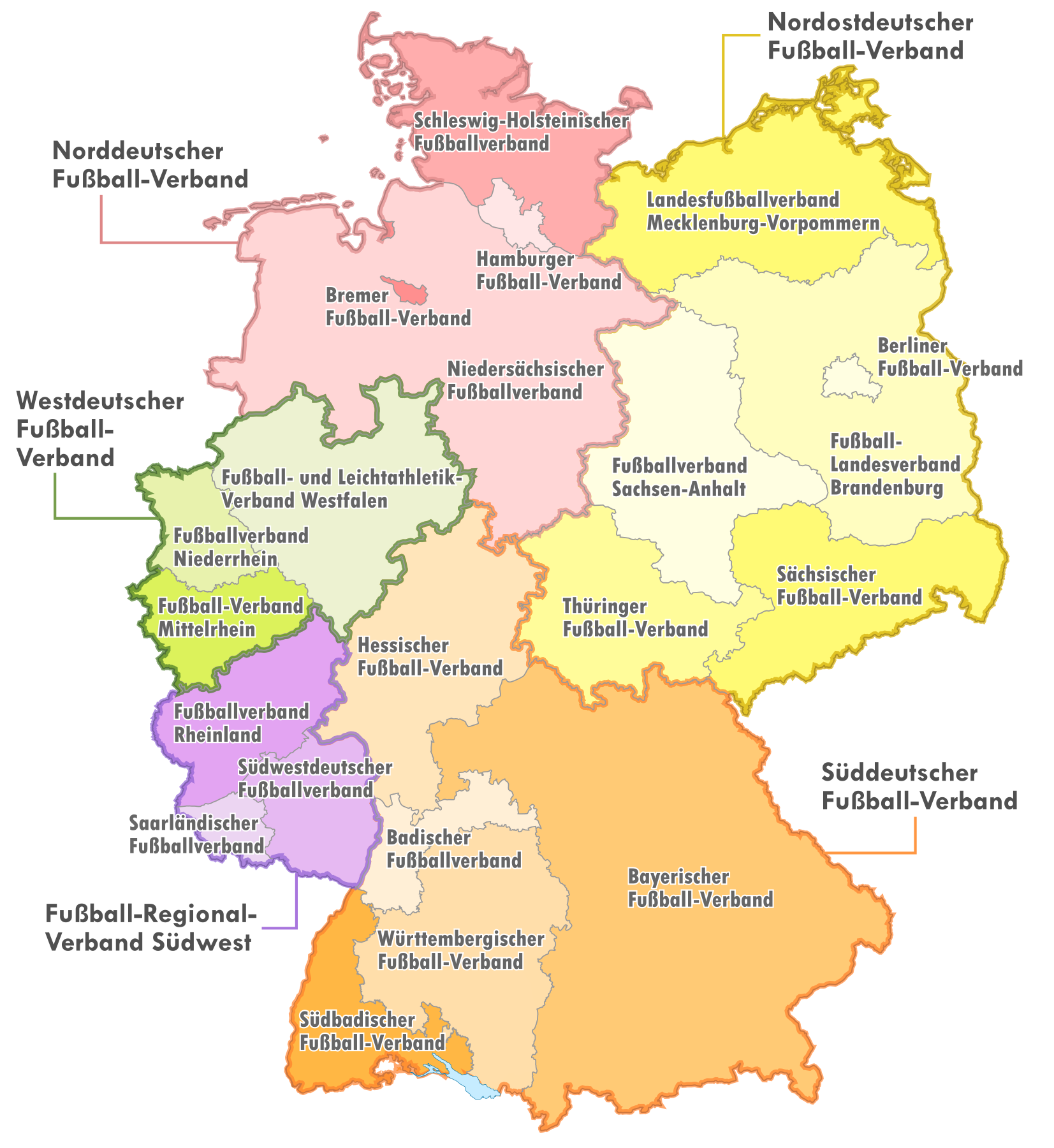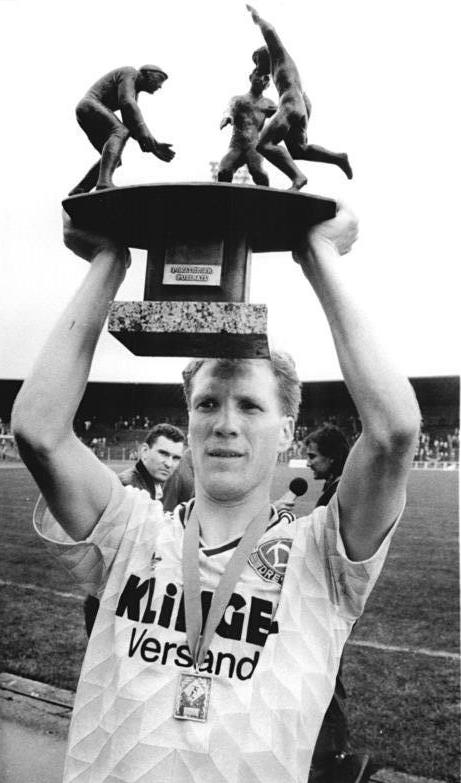|
Deutscher Fußball-Verband Der DDR
The Deutscher Fußball-Verband der DDR (DFV) was from 1958 the football association of the (East) German Democratic Republic, fielding the East Germany national football team until 1990 before rejoining its counterpart, the German Football Association (DFB), which had been founded in 1900. The ''DFV'' was dissolved on 20 November 1990 in Leipzig and in its place the North East German Football Association was formed and joined the German Football Association on the same day and at the same location, ''NOFV'' website, accessed: 7 April 2015 a few weeks after East Germany itself had ceased to exist with the on 3 October 1990. Presidents and General secretaries
|
UEFA
Union of European Football Associations (UEFA ; french: Union des associations européennes de football; german: Union der europäischen Fußballverbände) is one of six continental bodies of governance in association football. It governs football, futsal and beach football in Europe and the Eurasian transcontinental countries of Russia, Turkey, Cyprus, Azerbaijan, Armenia, Georgia, and Kazakhstan, as well as one Asian country Israel. UEFA consists of 55 national association members. Because of the 2022 Russian invasion of Ukraine, FIFA and UEFA suspended all Russian national teams and clubs from any FIFA and UEFA competitions. UEFA consists of the national football associations of Europe, and runs national and club competitions including the UEFA European Championship, UEFA Nations League, UEFA Champions League, UEFA Europa League, UEFA Europa Conference League, and UEFA Super Cup, and also controls the prize money, regulations, as well as media rights to those co ... [...More Info...] [...Related Items...] OR: [Wikipedia] [Google] [Baidu] |
FDGB-Pokal
The FDGB-Pokal (Freier Deutscher Gewerkschaftsbund Pokal or Free German Trade Union Federation Cup) was an elimination football tournament held annually in East Germany. It was the second most important national title in East German football after the DDR-Oberliga championship. The founder of the competition was East Germany's major trade union. History The inaugural FDGB-Pokal (generally referred to in English as the East German Cup) was contested in 1949, four years before the initial DFB-Pokal was played in the western half of the country. The first national cup competition had been the Tschammerpokal introduced in 1935. Each football club which participated in the East German football league system was entitled to enter the tournament. Clubs from the lower leagues played in regional qualification rounds, with the winners joining the teams of the DDR-Oberliga and DDR-Liga in the main round of the tournament of the following year. Each elimination was determined by a singl ... [...More Info...] [...Related Items...] OR: [Wikipedia] [Google] [Baidu] |
Sports Governing Bodies In East Germany
Sport pertains to any form of competitive physical activity or game that aims to use, maintain, or improve physical ability and skills while providing enjoyment to participants and, in some cases, entertainment to spectators. Sports can, through casual or organized participation, improve participants' physical health. Hundreds of sports exist, from those between single contestants, through to those with hundreds of simultaneous participants, either in teams or competing as individuals. In certain sports such as racing, many contestants may compete, simultaneously or consecutively, with one winner; in others, the contest (a ''match'') is between two sides, each attempting to exceed the other. Some sports allow a "tie" or "draw", in which there is no single winner; others provide tie-breaking methods to ensure one winner and one loser. A number of contests may be arranged in a tournament producing a champion. Many sports leagues make an annual champion by arranging games in a r ... [...More Info...] [...Related Items...] OR: [Wikipedia] [Google] [Baidu] |
Football In East Germany
The football league system of the German Democratic Republic (GDR, German: ''Deutsche Demokratische Republik'' or DDR) existed from 1949 until shortly after German reunification in 1991. Structure For most of its history, competitive GDR football was divided into three tiers. The Oberliga was founded in 1949, and served as GDR football's highest tier of competition throughout the country's existence. The Liga was founded in 1950 as the GDR's second tier of competitive football. Between 1950 and 1954, Liga clubs were divided into geographical sub-divisions. In 1955, the Liga switched to a single division format, before reverting to geography-based sub-divisions in 1962. Between 1952 and 1954, and from 1963 until 1990, the third tier of GDR competitive football consisted of several district leagues known as Bezirksliga. The boundaries of these ''Bezirksligen'' corresponded to each of the GDR's administrative divisions, with clubs assigned according to their location. In 1955, a ... [...More Info...] [...Related Items...] OR: [Wikipedia] [Google] [Baidu] |
Werner Lempert
Werner Lempert is a retired East German slalom canoeist who competed in the 1960s. He won two medals at the ICF Canoe Slalom World Championships with a gold in 1965 (Mixed C-2 team) and a silver in 1963 Events January * January 1 – Bogle–Chandler case: Commonwealth Scientific and Industrial Research Organisation scientist Dr. Gilbert Bogle and Mrs. Margaret Chandler are found dead (presumed poisoned), in bushland near the Lane Co ... (Mixed C-2). Lempert also served as the general secretary of the German Football Association of the GDR (DFV) between 1974 and 1983. References * German male canoeists Living people Year of birth missing (living people) Medalists at the ICF Canoe Slalom World Championships {{Germany-canoe-bio-stub ... [...More Info...] [...Related Items...] OR: [Wikipedia] [Google] [Baidu] |
German Federal Archives
, type = Archive , seal = , seal_size = , seal_caption = , seal_alt = , logo = Bundesarchiv-Logo.svg , logo_size = , logo_caption = , logo_alt = , image = Bundesarchiv Koblenz.jpg , image_caption = The Federal Archives in Koblenz , image_alt = , formed = , preceding1 = , preceding2 = , dissolved = , superseding1 = , superseding2 = , agency_type = , jurisdiction = , status = Active , headquarters = PotsdamerStraße156075Koblenz , coordinates = , motto = , employees = , budget = million () , chief1_name = Michael Hollmann , chief1_position = President of the Federal Archives , chief2_name = Dr. Andrea Hänger , chief2_position ... [...More Info...] [...Related Items...] OR: [Wikipedia] [Google] [Baidu] |
Koblenz
Koblenz (; Moselle Franconian: ''Kowelenz''), spelled Coblenz before 1926, is a German city on the banks of the Rhine and the Moselle, a multi-nation tributary. Koblenz was established as a Roman military post by Drusus around 8 B.C. Its name originates from the Latin ', meaning "(at the) confluence". The actual confluence is today known as the " German Corner", a symbol of the unification of Germany that features an equestrian statue of Emperor William I. The city celebrated its 2000th anniversary in 1992. It ranks in population behind Mainz and Ludwigshafen am Rhein to be the third-largest city in Rhineland-Palatinate. Its usual-residents' population is 112,000 (as at 2015). Koblenz lies in a narrow flood plain between high hill ranges, some reaching mountainous height, and is served by an express rail and autobahn network. It is part of the populous Rhineland. History Ancient era Around 1000 BC, early fortifications were erected on the Festung Ehrenbreitstein ... [...More Info...] [...Related Items...] OR: [Wikipedia] [Google] [Baidu] |
German Reunification
German reunification (german: link=no, Deutsche Wiedervereinigung) was the process of re-establishing Germany as a united and fully sovereign state, which took place between 2 May 1989 and 15 March 1991. The day of 3 October 1990 when the German Reunification Treaty entered into force dissolving the German Democratic Republic (GDR; german: link=no, Deutsche Demokratische Republik, DDR, or East Germany) and integrating its recently re-established constituent federated states into the Federal Republic of Germany (FRG; german: link=no, Bundesrepublik Deutschland, BRD, or West Germany) to form present-day Germany, has been chosen as the customary '' German Unity Day'' () and has thereafter been celebrated each year from 1991 as a national holiday. East and West Berlin were united into a single city and eventually became the capital of reunited Germany. The East Germany's government led by the Socialist Unity Party of Germany (SED) (a communist party) started to falter on 2 ... [...More Info...] [...Related Items...] OR: [Wikipedia] [Google] [Baidu] |
North East German Football Association
The Northeastern German Football Association (german: Nordostdeutscher Fußballverband), the ''NOFV'', is one of five regional organisations of the German Football Association, the ''DFB'', and covers the states of Berlin, Brandenburg, Mecklenburg-Western Pomerania, Saxony, Saxony-Anhalt and Thuringia.Regional Associations ''DFB'' website. Map and details of the regional associations. Retrieved 7 April 2015 Overview  The ''NOFV'' was formed on 20 November 1990 in
The ''NOFV'' was formed on 20 November 1990 in
|
Deutscher Fußball-Bund
The German Football Association (german: Deutscher Fußball-Bund ; DFB ) is the governing body of football in Germany. A founding member of both FIFA and UEFA, the DFB has jurisdiction for the German football league system and is in charge of the men's and women's national teams. The DFB headquarters are in Frankfurt am Main. Sole members of the DFB are the German Football League (german: Deutsche Fußball Liga; DFL), organising the professional Bundesliga and the 2. Bundesliga, along with five regional and 21 state associations, organising the semi-professional and amateur levels. The 21 state associations of the DFB have a combined number of more than 25,000 clubs with more than 6.8 million members, making the DFB the single largest sports federation in the world. History 1875 to 1900 From 1875 to the mid-1880s, the first kind of football played in Germany was according to rugby rules. Later, association-style football teams formed separate clubs, and since 189 ... [...More Info...] [...Related Items...] OR: [Wikipedia] [Google] [Baidu] |
Leipzig
Leipzig ( , ; Upper Saxon: ) is the most populous city in the German state of Saxony. Leipzig's population of 605,407 inhabitants (1.1 million in the larger urban zone) as of 2021 places the city as Germany's eighth most populous, as well as the second most populous city in the area of the former East Germany after ( East) Berlin. Together with Halle (Saale), the city forms the polycentric Leipzig-Halle Conurbation. Between the two cities (in Schkeuditz) lies Leipzig/Halle Airport. Leipzig is located about southwest of Berlin, in the southernmost part of the North German Plain (known as Leipzig Bay), at the confluence of the White Elster River (progression: ) and two of its tributaries: the Pleiße and the Parthe. The name of the city and those of many of its boroughs are of Slavic origin. Leipzig has been a trade city since at least the time of the Holy Roman Empire. The city sits at the intersection of the Via Regia and the Via Imperii, two important medie ... [...More Info...] [...Related Items...] OR: [Wikipedia] [Google] [Baidu] |





